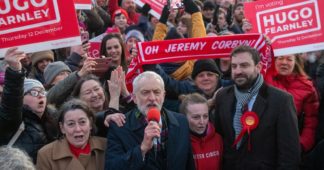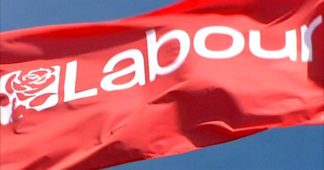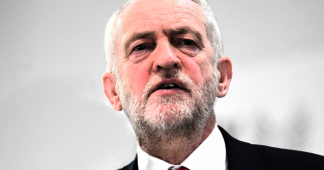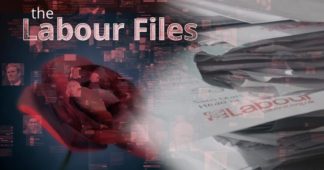GLASTONBURY Festival’s decision to block a screening of Oh, Jeremy Corbyn: the Big Lie must be seen in a context of increased political censorship.
Bombarding event organisers and sponsors with demands that they cancel contentious events is becoming commonplace, and too often — as at Glastonbury, or Tolpuddle, or indeed London’s Conway Hall cancellation of a No to Nato rally back in February — this pressure is successful.
The effect on democratic debate is poisonous, and no-platforming the Platform Films production on the forces that brought down the Corbyn movement is doubly significant.
Because Labour, whose anti-democratic attacks on members are detailed in the film’s last section, is at the forefront of efforts to shrink our political horizons.
It was Labour’s “new management” that abused the notion of safe spaces back in 2020 to impose a dystopian ban on constituency parties even discussing the suspension of the man who had been party leader at the start of that year, claiming — absurdly — that such discussion might make Jewish members feel unsafe.
The sweeping prohibitions on debate have continued since.
We’re no longer surprised by reports that at a North West Durham party meeting discussing candidates for the role of North East mayor, members were warned that if they even mentioned current North of Tyne Mayor Jamie Driscoll — blocked from a shortlist for the enlarged role — they would face disciplinary action.
Labour also cracks down on political dissent. Keir Starmer has tried to excommunicate the Stop the War Coalition, intimidating MPs into removing their names from one of its statements when Russia invaded Ukraine (though the statement condemned the invasion) and scaring them away from anti-war platforms.
The only speaker at last autumn’s Labour conference to oppose a motion backing arms to Ukraine was subjected to disciplinary action within 24 hours.
These, it could be argued, are internal party questions. But they have wider ramifications for several reasons.
First, Labour — contradictory beast that it is — has through its trade union link been the main vehicle for working-class representation in Parliament for a century.
But the determination to fix every selection for the Starmer faction is driving the working class out of politics. Ordinary workers rooted in their communities, like Birkenhead’s Mick Whitley, Cynon Valley’s Beth Winter or Kensington’s Emma Dent Coad, are giving way to career politicians who went to the right schools and know the right people.
Second, Labour’s internal attacks on democracy affect the national debate. A few years ago, the International Holocaust Remembrance Alliance definition of anti-semitism was a little known document, whose own author, Kenneth Stern, had distanced himself from it after acknowledging it was being abused to shut down criticism of Israel.
Picked up by the Labour right as a stick to beat Corbyn with, it has now become almost obligatory for British institutions, despite widespread criticism of it including from Jewish groups. This has facilitated Tory legislation seeking to outlaw the boycott, divestment and sanctions movement in solidarity with Palestine.
And third, the Labour leadership’s contempt for democracy and due process suggests it will continue the extraordinary authoritarian drive of the current government — one that is trying to ban effective strikes and empowers police to shut down protests before they even begin.
Democratic rights and free speech are at risk, as the outrageous ongoing detention of journalist Julian Assange shows.
The Oh, Jeremy Corbyn film is attracting large audiences around the country. That is why it spooks those determined to consign Britain’s socialist revival to the history books.
Allowing it to reach beyond the ranks of political activists and address a large, general audience like that at Glastonbury was intolerable to them.
But in giving in, civil society organisations become complicit in a censorship drive directed by the ruling class, one which has already gone too far.
We remind our readers that publication of articles on our site does not mean that we agree with what is written. Our policy is to publish anything which we consider of interest, so as to assist our readers in forming their opinions. Sometimes we even publish articles with which we totally disagree, since we believe it is important for our readers to be informed on as wide a spectrum of views as possible.











